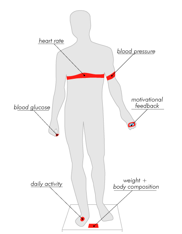Dead Ends and Walled Gardens
Gary Wolf
December 3, 2008
 The dead end. The cul-de-sac. The walled garden. These are three different ways (using 2.5 different metaphors) to refer to services that allow you to communicate and display information but not to copy, transfer, or share your data with outsiders. It’s an internet dogma that dead ends, culs-de-sac, and walled gardens are bad.
The dead end. The cul-de-sac. The walled garden. These are three different ways (using 2.5 different metaphors) to refer to services that allow you to communicate and display information but not to copy, transfer, or share your data with outsiders. It’s an internet dogma that dead ends, culs-de-sac, and walled gardens are bad.
I subscribe to this dogma. The belief that we should be able to use a
service, such as a mobile
phone, a social networking site, or a hospital, without being taken
hostage, has intuitive appeal. The favorite reference point for the
failure of walled gardens is the stagnation of the online pioneer AOL,
which, in the Great Internet Creation Myth, represents the
morally-pleasing downfall of an arrogant oligarch. Every new service
that holds on to its users by making it hard for them to export data
inevitably earns comparison to AOL.
At a recent QS Show&Tell we heard a good presentation from Brandon, who works at A&D Weighing about new devices that will automatically upload biometrics to a web site. (Video here.) Brandon was good humored about the hard time he got when he revealed that the data will not exportable, will not be shareable, and will be accessible only through Actihealth Monitoring System, a walled garden (dead end? cul-de-sac?) of data owned by a biometrics/fitness company called Fitlinxx. Biometrics belong to users – don’t they?
But here is a counter-example. Earlier in the week I visited the innovation research lab of Kaiser Permanente, where they are very keen on biometrics, and heard one of the docs talk about KP Connect, the online medical records system internal to Kaiser. This system is somewhat legendary, and not always for good reasons. Reported to cost upwards of 4 billion dollars, KP Connect is extraordinarily ambitious, combining what we ordinarily think of as medical records (lab results, prescriptions, physical complaints, observed symptoms, etc.) with appointment reminders, at-home biometrics, and expert-systems for advising doctors on treatment options.
It struck me, as I listened, that the Kaiser garden has very high walls. Most of the information in the system is government by privacy regulations, making it exportable and shareable only upon verified patient request. But that’s not really what makes these walls high. Kaiser, as an HMO, is both an insurer and a medical care provider – it knows more about your health than anybody else, and almost certainly more than you know yourself. The user experiences just the outward surface of KP Connect, the place where they see whether a child’s immunizations are up to date, or make an appointment to get a flu shot. But Kaiser can use the system to send reminders about medication, to suggest changes in treatment based on new research, and to aggregate data from which they can draw new inferences. They have begun to integrate the data on KP Connect with large genomic studies using volunteers who are Kaiser members – this will give ever more depth and complexity to the processes that control life in the walled garden. You can always choose to leave; but it may not be as verdant on the outside.
With these advantages, it is hardly necessary to keep individual data hostage. In fact, the biometrics gathered on KP Connect can be exported to Microsoft Health Vault, and from there they can be exported into files in standard formats. You can carry it around with you on your little flash drive, on your iPhone. You can publish your own little personal reports. But to make it meaningful, you may end up planting it somewhere.


